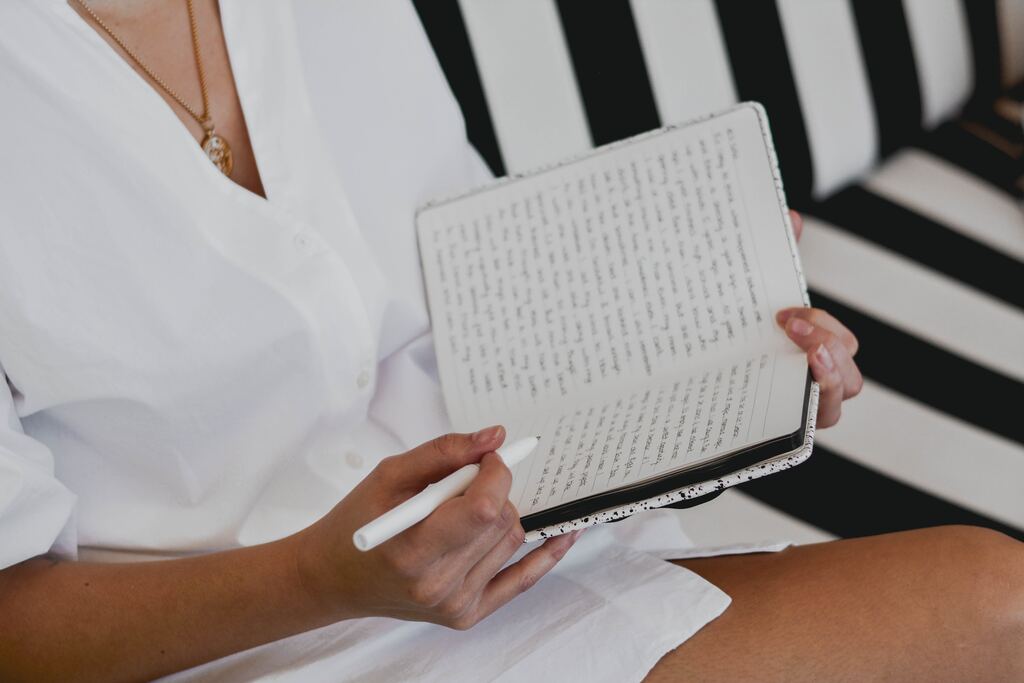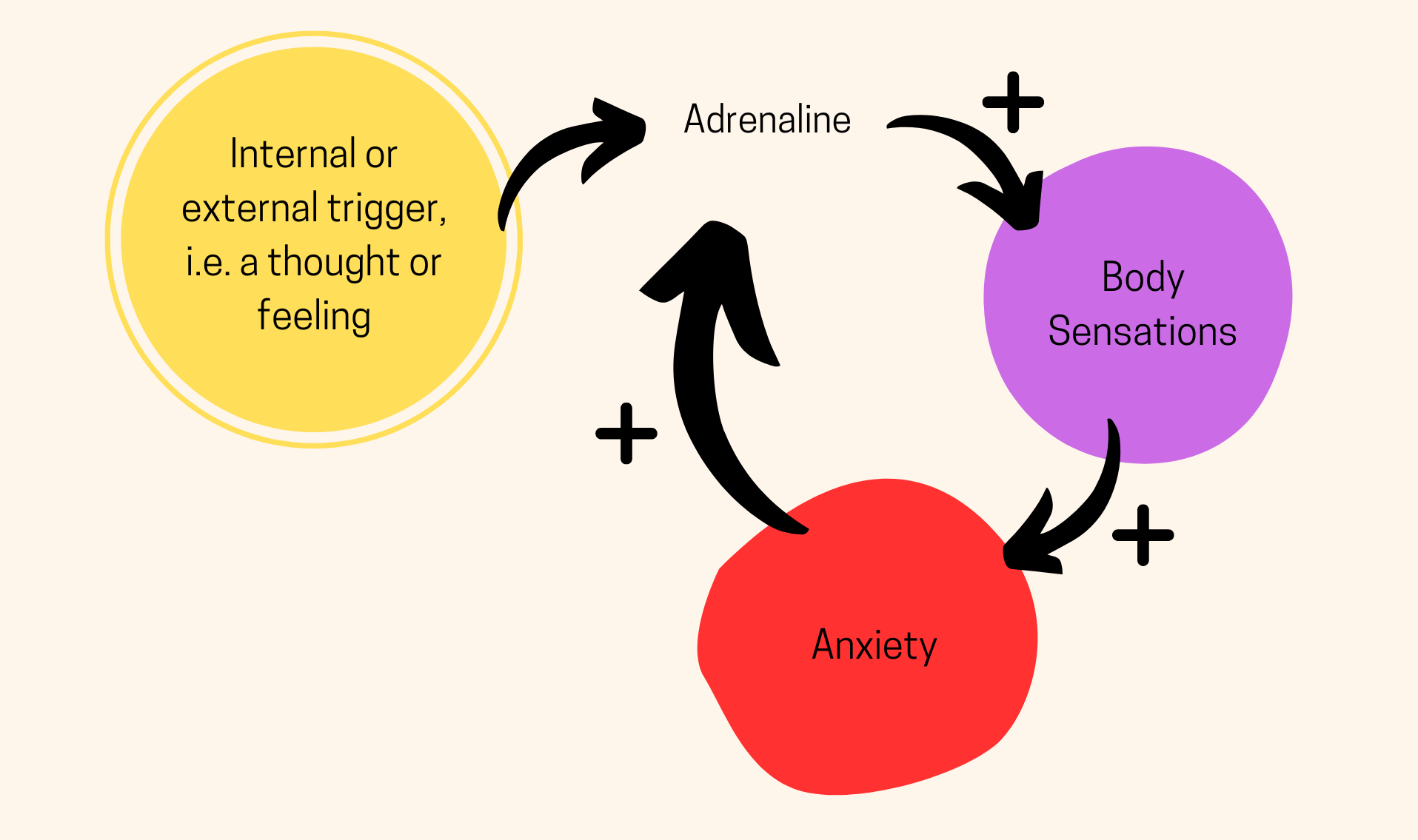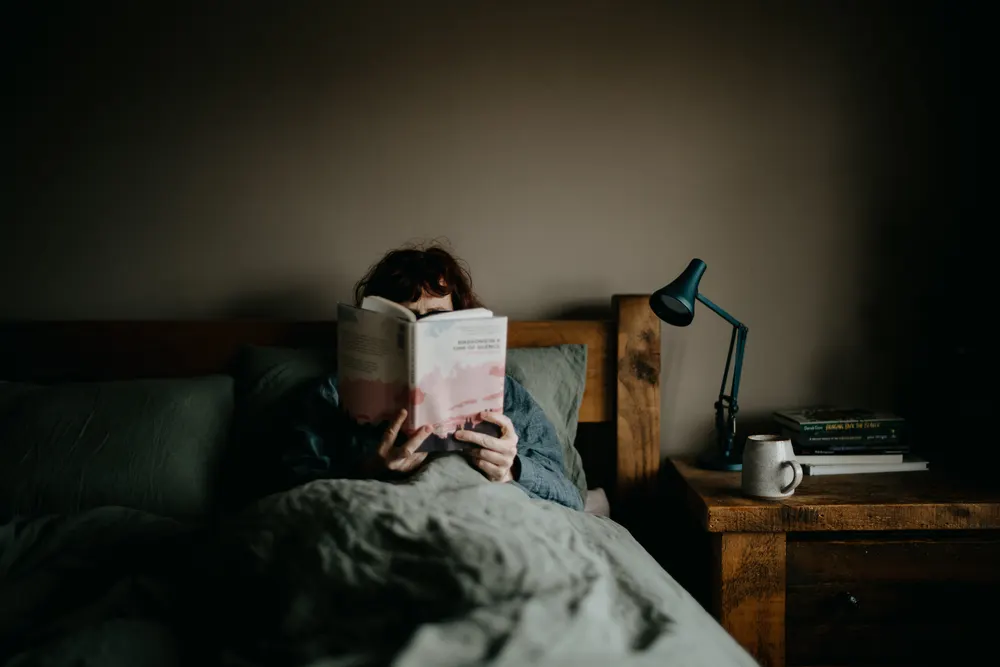For the better part of my teenage years and twenties, I struggled with anxiety and panic attacks. It got so bad at some point that I even had panic attacks in my own bed. I didn’t feel safe anywhere anymore. My anxiety levels were so high that I felt a constant tightness in my throat, as if something was closing my throat. I was focused on my anxiety all day. Of course, that wasn’t helping. It was terrifying. Sometimes, I was struggling just to get through the days.
I was a student at that time, and in my mid-twenties, I decided that it had to change. I had to work on my anxiety. Somehow more profoundly than anything I had learned from the several therapies I went to for my panic attacks throughout the years. I made the conscious decision that I wasn’t going to live like this for the rest of my life. I can tell you: it wasn’t easy. It was sometimes one step forward and two steps back. But I eventually found my way out. You can read some diary entries I wrote during that period here.
What I wanted to share here are some key learnings from my recovery from panic attacks.

1) It made perfect sense that I had panic attacks
I never understood why I was different from everyone else. Why can “normal people” sit on a train, completely relaxed, and even enjoy it, while my body finds it necessary to ring all the alarm bells within me? I knew that there was nothing to be afraid of. But still, so many things made me anxious for no obvious reason at all.
What I learned from my degree in neuropsychology and the book ‘The Body Keeps the Score’ by Bessel van der Kolk, amongst other things, is that, indeed, your brain and so your body keep the score. If the body has been under too much pressure for a prolonged period of time without sufficient opportunity to recover, the nervous system gets exhausted. The longer and more often you feel anxious, the less you need to get overstimulated.
Secondly, the brain associates negative thoughts or feelings with certain places. The amygdala in particular is responsible for this; it is a small structure in your brain that is related to emotional learning. If you were anxious or had a panic attack in a certain place, you’ll be much more susceptible to anxious thoughts and, therefore, a panic attack when you return to that place.
My brain was programmed in a way that wasn’t helping me. Being in a certain place, or being in a place that resembled it or reminded me of it somehow, would immediately start the vicious cycle, as shown below. When I had the first anxious thought, I basically told my brain, “I am anxious here. I may have to run.” And so my body pumps adrenaline into my blood. That adrenaline then gave me all sorts of bodily sensations, such as a pounding heart, which increased my anxiety. At this point, I let my brain know that I got more anxious and in return the brain, thinking I must be in a life-threatening situation, pumps more blood into my bloodstream, leading to stronger bodily sensations, which increase my anxiety even more. Et cetera. That is the vicious cycle of a panic attack. It spirals into a full-blown panic attack unless you know how to stop it.
My body was very tense, and I didn’t know how to prevent starting the vicious cycle, or how to stop it once it had started. So it made perfect sense that I had panic attacks.

2) I’m never alone in what I’m feeling
This simple notion is something I realised sometime during my recovery process. I wrote about it here. It is so normal to think that we must be the only ones feeling or experiencing something. But the truth is, you are never alone in what you’re feeling. There are many forums on the internet where people share experiences. Often anonymously, like on Reddit. It can be a calming thought to realise that you are not alone. I sometimes think about how small I am in this world—one person out of 8 billion people. Every single person has their own struggles and insecurities.
Right now, at this very moment, this very second, someone is getting married. Someone is bungee jumping. Someone is in a fight with their partner. Someone is sleeping. Someone is swimming in the ocean. Someone is getting ready for the day. Someone is reading in bed. Someone is sitting for an exam. Someone is stuck in traffic. I sometimes think about this when I feel like I’m too focused on myself and my anxious thoughts.
3) Every emotion is impermanent
Anger, sadness, and happiness are all emotions that come and go. No emotion or feeling is impermanent. Anxiety is an emotion too. A panic attack is an extreme form of anxiety. However intense the emotion, it will always pass. This is something I learned from the books ‘The Power of Now’ and ‘A New Earth’ by Eckhart Tolle. It’s also something you can learn from doing meditation. Theoretically, any situation is neutral, but we tend to give it either a positive or negative meaning.
4) Morning and evening routines matter
A good morning routine sets you up for a good day. Right after we wake up, cortisol levels are often highest. That means that you can feel more anxious in the morning. So you want to start the day as relaxed as possible. That means no coffee (!!!) Caffeine is a stimulant. If you already feel tense, you don’t want the extra adrenaline. No phone for the first hour of the day is also very helpful. I try to be mindful as much as I can. For example, when brushing my teeth, I used to think about my to-do list for the day. But I now try to be present. How does my body feel? Can I stand a bit straighter? Are my muscles relaxed? I learned that getting ready for the day is the perfect time to practise being present because that is when you normally perform habits that you don’t even think about. I try to pay attention to what I’m actually doing. What exactly am I doing right now? What movements am I making?
A good evening routine sets you up for a good night. And sleep is so important. More important than diet, I would say. People who experience anxiety often also have sleeping problems. So you want to end your day feeling as relaxed as possible. Turn off your phone at least an hour before going to bed. Set aside some time in your evening to write about your day, your worries, and your to-do list for the next day, or go through it in your head before you actually go to bed. Yoga was personally my number one evening routine activity. After that, I would read a novel in bed. Whatever works for you, do the things that relax you.

5) Being mindful is hard work
Recovering or healing requires a lot of mental energy. Other people cannot see that you’re working hard. Going through a panic attack is very draining. It’s not visible to others what is going on in your mind.
It is not easy to be fully present. Have you ever tried meditation? Then you have probably experienced that your mind starts wandering off after only a few seconds. You need to constantly bring your focus back to your breath, and that is hard work.
Part of recovering from anxiety and panic attacks requires you to focus on your thinking patterns. Not just during a panic attack but rather throughout the day. Why? We all have a negativity bias. We immediately interpret a situation negatively, in case it might be dangerous and we need to run. We as humans can observe our thoughts and change the way we respond so that we interpret something as neutral or positive instead of negative. But to be able to do this, you need to practise.
Luckily, it does get easier. I have learned that it makes life a lot lighter and more pleasant. If you are “in the now”, you can’t be in the past or in the future, where worries live.
6) Self-talk is everything
We tend to talk negatively about ourselves. And we often don’t even realise it. Addressing your self-talk is a key ingredient to recovering from anxiety and panic attacks. That’s why I focus on self-talk in The Program. I call this the presentation step, because when you experience panic attacks, you need to learn to present the panic attack to yourself in a way that is positive and that calms you down. In the same way that you wouldn’t criticise a friend for the way they feel, you shouldn’t criticise yourself. The only person you need to spend your entire life with is you, so it’s crucial to learn to be kind to yourself always. The opinion you have of yourself is more important than the opinion others have of you.
7) Working on your habits and lifestyle improves not only your anxiety but your quality of life in general
I was too focused on my anxiety. It felt like it demanded all of my attention. But when I started doing more exercise, eating healthily, reading, and other things that are now habits as part of my lifestyle, my anxiety gradually decreased. It was still there in the beginning, but it moved more and more to the background until it eventually disappeared. Of course, I still have anxiety now and then, but that is completely normal. It doesn’t dictate my life anymore.
A healthy lifestyle is so important for general well-being. It can make you feel strong and healthy, and because of it, you can learn to trust your body. You can learn that, whatever happens, you will be OK. You are safe in your body. That is an amazing feeling to obtain, one that I never had before. When you move your body during the day, it’s also easier to relax afterwards and sleep better. Everyone knows how important a healthy lifestyle is, but I can definitely say it was a game changer in my recovery from panic attacks as well. That’s why lifestyle is one of the pillars of The Program.
8) Knowing is not enough
This is what I realised when I received therapy for my panic attacks in the form of cognitive behavioural therapy, or talking therapy. The therapists taught me that my thoughts were irrational. It was just my body’s alarm system, and I wouldn’t need to be afraid of it. They taught me that I can’t faint from a panic attack because it’s biologically impossible. Fainting happens because of a sudden drop in blood pressure, while your blood pressure rises during a panic attack. They taught me that I am not losing control when I’m experiencing a panic attack. They explained to me what anxiety is and what happens during a panic attack.
I knew all of these things, but I still had panic attacks. Things only changed when I started practising with my fears, and I felt the change. Again, I’m referring to the book ‘The Body Keeps the Score’ by Bessel van der Kolk. Feeling is understanding. You need to feel the change in order to understand that you are indeed safe. Simply telling someone that they’re safe doesn’t help.
9) It is possible to completely recover from panic attacks
Believe me if I say I never would have thought that I could live a life without panic attacks. I have had them for so long that they were part of my identity. But I did recover, and I don’t experience panic attacks anymore.

If you experience panic attacks and feel like you’re stuck, I want to invite you to take a look at The Program. This program might be just what you were looking for. I can be there for you on your way to recovery.